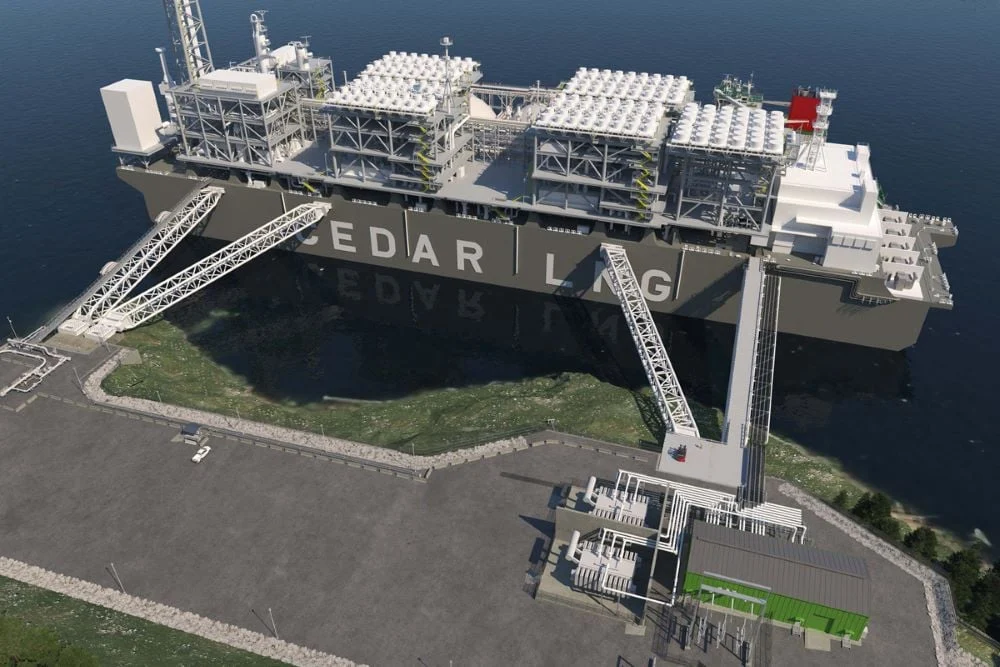Canadian energy infrastructure company Pembina Pipeline and the Haisla Nation, an aboriginal people from British Columbia, Canada, have signed shipyard capacity agreements with South Korean shipbuilder Samsung Heavy Industries and U.S.-based engineering firm Black & Veatch for the planned Cedar LNG project in Canada.

Specifically, the agreement provides the basis for Cedar LNG to work exclusively with Samsung Heavy Industries and Black & Veatch by securing shipyard capacity to meet the Cedar LNG project’s target commercial operation date. The agreement further advances the project following the receipt of all major regulatory approvals and the signing of a Memorandum of Understanding (MoU) with an investment grade counterparty for long-term liquefaction services in relation to the project’s total LNG capacity. The parties expect to finalize the engineering, procurement and construction agreement in December 2023.
Cedar LNG stated, “Cedar LNG elected to progress a second front-end engineering design (FEED) process for the floating LNG vessel in late 2022 and has been waiting for that work to progress to the same stage as the original FEED. In conjunction with detailed commercial discussions and ongoing negotiations between LNG Canada and Coastal GasLink, this has resulted in the anticipated final investment decision being revised to the fourth quarter of 2023”.
Cedar LNG CEO Doug Arnell said, “The exclusive partnership with Samsung Heavy Industries and Black & Veatch to book shipyard capacity for the construction of the Cedar LNG FLNG is a significant step forward for the project.”
Pembina Pipeline and HighSlope Nation plan to build a $2.4 billion FLNG for the project. The FLNG, which will have a capacity of approximately 3 million tons per year, is planned to extract natural gas from the rich Montney Resource Area in northeastern British Columbia and has a long-term transportation agreement for 400 million cubic feet per day on the ” The LNG will be located near a Canadian LNG plant and will be powered by renewable energy from British Columbia.
In August of this year, the Korean shipbuilding community had predicted that Samsung Heavy Industries would be awarded this FLNG order. Back in February 2022, Samsung Heavy Industries was awarded the FLNG front-end engineering and design (FEED) contract for the Cedar LNG project in partnership with Black & Veatch. Samsung Heavy Industries is responsible for the FLNG hull, LNG containment system and upper module integration; Black & Veatch is responsible for the design and fabrication of the upper modules. To date, five FLNGs have been built and delivered globally, four of which are from Samsung Heavy Industries. Moreover, Samsung Heavy Industries has participated in the FEED of several FLNG projects, laying a solid foundation for subsequent orders.
Samsung Heavy Industries, the “FLNG leader,” has been focusing on research and development of related technologies since 2018, based on its experience in the construction of the world’s first three phases of FLNG, etc. It has successfully localized natural gas (NG) liquefaction equipment, which is the core technology of FLNG, for the first time in Korea in 2020, and has successfully commissioned the FLNG plant in 2021.
In May, Samsung Heavy Industries unveiled its next-generation floating LNG production unit, MLF-N (Multi-purpose LNG Floater-Nearshore), at the Offshore Technology Conference & Exhibition (OTC 2023) in Houston, U.S.A., and received Approval-in-Principle from DNV.
The MLF-N design is said to have standardized hull and equipment specifications, based on Samsung Heavy Industries’ proven performance and technology. By standardizing the shape of the LNG liquid cargo tanks as well as the width and height around the FLNG hull, the new design can increase the cargo tank capacity from 180,000 m3 to 245,000 m3 as required.
Also, the design features a stable structure to support the upper set of equipment weighing approximately 50,000 tons (including the natural gas liquefaction module). In addition, it standardizes the optimum specifications for the main equipment to be installed on the hull, which can significantly shorten the engineering cycle.
Global shipbuilders are currently placing a high priority on global carbon neutrality targets, with LNG carriers, FLNG and Floating Liquefied Natural Gas Storage Regasification Units (LNG-FSRUs) in the spotlight. These shipbuilders aim to reinforce the decarbonization tone in order to adapt to stricter environmental regulations around the world.


